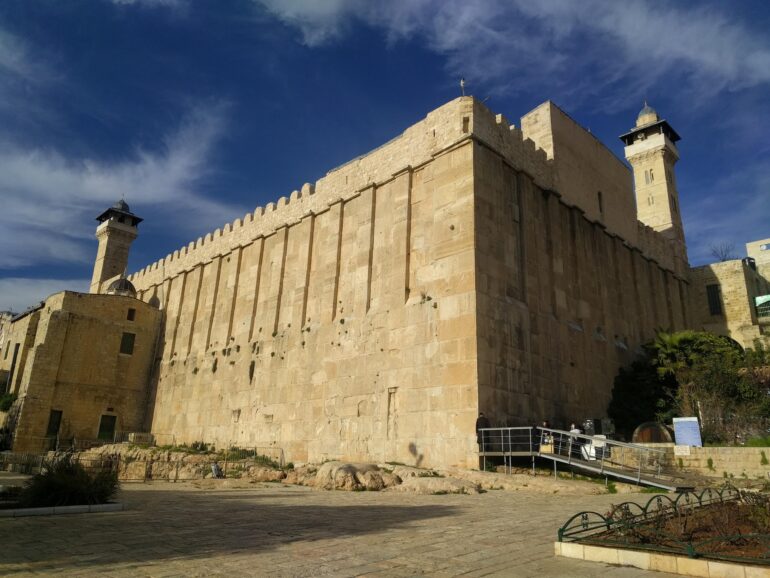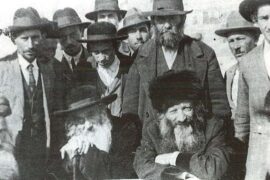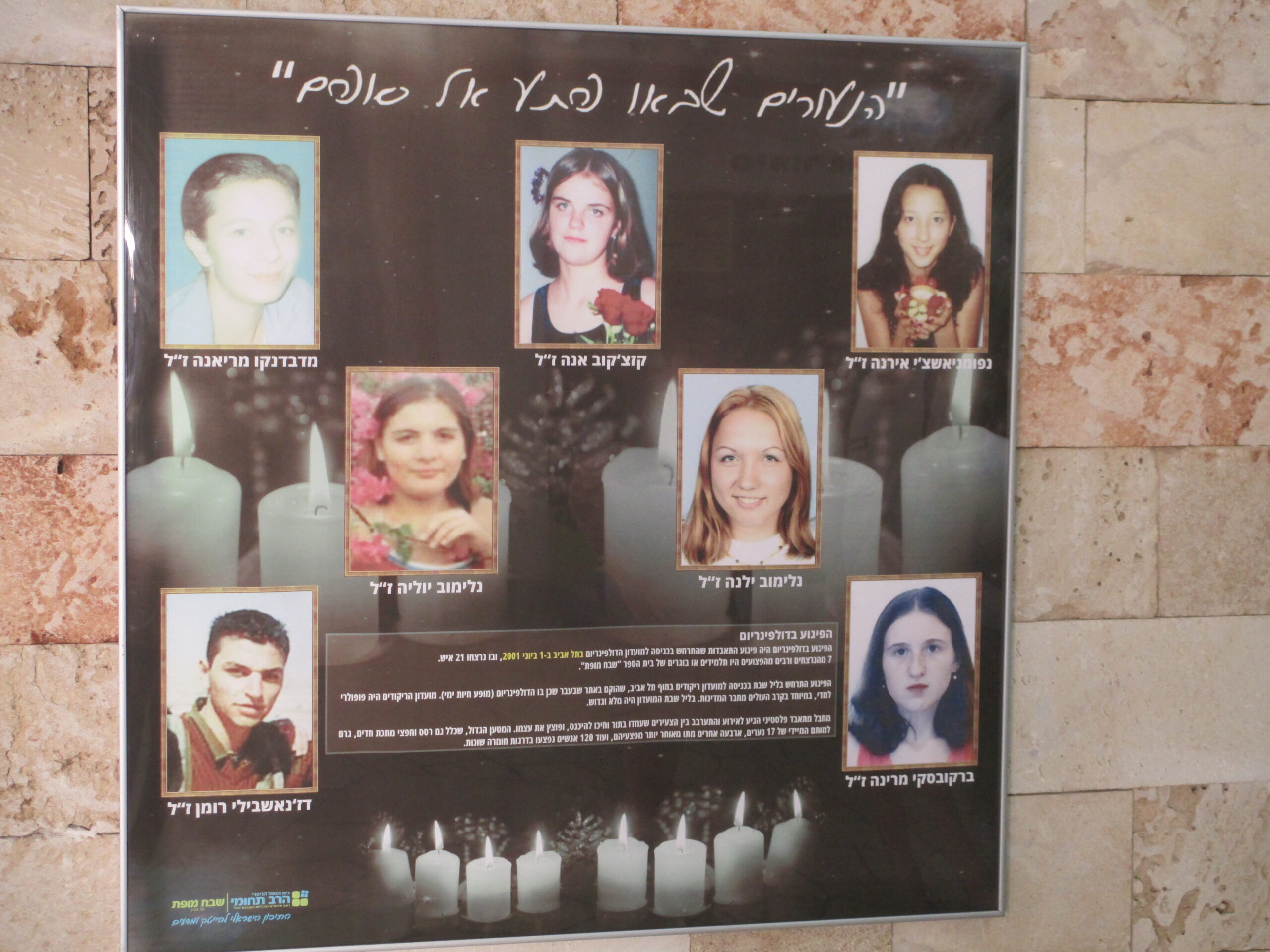Parshat Ḥayei Sarah shows a transition of leadership from Avraham to Yitzḥak.
But how was Yitzḥak able to get out from under Avraham’s towering shadow and win over Yishmael to recognize his place as their father’s heir?
For more content from VISION Magazine, subscribe to our newsletter and follow us on Twitter @VISION_Mag_, Facebook and YouTube. If you haven’t already, don’t forget to subscribe to our podcast on SoundCloud, iTunes, Stitcher, TuneIn, or Spotify and leave a rating and review to help us get our message out to a wider audience!
To support the podcast, head over to our PayPal portal and be sure to write a note that your contribution is for the podcast.
Hosted by: Yehuda HaKohen
Transcript:
Although it might superficially seem as if the names of each parsha – each weekly Torah portion – are just mechanically extracted from the first few words of their respective parshiot, the name of each parsha actually expresses the essence of what that weekly section of our Torah is all about.
Parshat Ḥayei Sarah, which literally means the “life of Sarah” might at first seem like a strange name for this week’s parsha, especially given the fact that it begins with Sarah’s death and burial but then moves on to other topics. But if we look at the three major stories that take place in this parsha, we can see manifestations of Sarah’s legacy having a major influence on events.
Everything that takes place in Parshat Ḥayei Sarah should be understood as the direct result of Sarah’s lasting influence over Avraham and as crucial victories she won after her death, through which she was able to guide her family in the direction that she understood to be best for its development into the nation of Israel.
The first of Sarah’s victories is that Hebron essentially became the main location of her family’s future development.
Avraham had until Sarah’s death been more inclined to live in B’er-Sheva, as a spiritual leader within the Philistine kingdom ruled by Avimelekh. Avraham wasn’t especially interested in dealing with matters of statecraft but wanted to spread his teachings of ethical panentheism and bring people close to the Creator. That’s what excited him. That’s where he felt his soul being fully expressed. So it’s understandable that he might have preferred a situation in which powerful kingdoms adopted his spiritual teachings.
This was essentially the deal that Avimelekh offered him. The Philistine king saw Avraham as an important figure and basically gave him an honored place as a spiritual leader within his realm of influence. But this required Avraham to accept the reality of Avimelekh having political sovereignty over parts of the Land of Israel.
Sarah rejected this orientation because she understood that the Hebrews could only fulfill our historic mission as a sovereign nation that deals with and applies our spiritual values to all areas of national life. For this reason, Sarah believed that the family should live in Hebron, which required Avraham to hold and manage sovereign territory.
The family had previously lived in Hebron but had moved after the destruction of S’dom – which had been directly east of Hebron – created a significant decrease in travelers for Avraham to engage and teach. So through her death in Hebron, Sarah forced Avraham to return the family back to that city.
Sarah’s second major victory was Avraham’s decision to find a Hebrew wife for Yitzḥak from among their relatives. Because Avraham inclined towards universalism, and had previously regarded his marriage to the Egyptian princess Hagar as a way to influence Egyptian civilization with his teachings, he might have seen value in Yitzḥak marrying a woman from another dominant nation. But Sarah’s nationalist orientation ultimately won out and, following her lead, Avraham took steps to ensure that his successor would only marry an ethnic Hebrew. The story of Eliezer traveling to Aram to find a bride for Yitzḥak, which is the central focus of this parsha, is the result of Avraham fully adopting Sarah’s path.
And Sarah’s third victory can be found at the end of the parsha, in the story of Avraham’s children from Ketura – who our Sages teach us to have actually been Hagar. While it was proper for Avraham to take another wife for himself after Sarah’s death, it’s also clear that Avraham understood by this point that only Sarah’s son Yitzḥak could be his heir and successor. We see this expressed in Avraham’s decision to send Ketura’s sons to the east. He gave them gifts, but didn’t make them his heirs. Avraham at this point seemed able to utilize Sarah’s attribute of g’vura in order to create appropriate boundaries for the expression of his ḥesed.
In any case, even after Sarah left our world, her opinions and desires continued to influence Avraham’s decisions, which is of course a very powerful testament to the relationship they shared.
This parsha also features a transition from the leadership of Avraham to the leadership of Yitzḥak in building the family and future nation of Israel. We see this very clearly in the fact that when the servant Eliezer returned from his mission, he reported not to Avraham who had sent him but to Yitzḥak. Avraham had to a certain extent retired. And Yitzḥak was now essentially head of the family.
Yitzḥak’s position as leader and public face of the Hebrew message to mankind likely came with challenges. Avraham had essentially been a self-made man who underwent a major personal transformation through overcoming challenges and an incredible journey that achieved an exclusive Covenant with the Creator.
But Yitzḥak was born into the Covenant. He didn’t achieve it. And it’s often very challenging to be the son and successor of a great man – to always live in the shadow of a towering figure and to feel a constant need to measure up. It’s even challenging to hold onto past achievements, let alone augment them with new ones.
Yitzḥak overcame these challenges partially by being so different from his father. Unlike his older brother Yishmael, who was very much a copy of Avraham and also exemplified the trait of ḥesed, Yitzḥak was more like Sarah and, like Sarah, he exemplified the attribute of g’vura.
The differences between Avraham as ḥesed and Yitzḥak as g’vura can be seen in the fact that Avraham was a leader his entire life, while Yitzḥak had for the most part been led. Avraham was constantly on offense. He took the initiative to create the world he wanted to see. But Yitzḥak was always very much on defense.
Ḥesed seeks to spread out and expand. Therefore it’s proactive and constantly advances. G’vura, by contrast, seeks to maintain the status quo. It’s conservative by nature and doesn’t initiate anything new but only reacts to what already exists.
Yitzḥak’s entire personal mission seems to have been the preservation of his father’s teachings and their transmission to the next generation. He gave these teachings boundaries for proper expression but he didn’t really add to them.
It’s also important to note that Yitzḥak used this attribute of g’vura to properly channel his father’s message of ḥesed. Following the death of his mother Sarah, Yitzḥak travels to B’er Laḥai Ro’i to bring back Hagar to remarry Avraham. Yitzḥak had put the issues between his mother and Hagar aside because he understood that his father shouldn’t be unmarried. This is what likely caused Yishmael to finally recognize Yitzḥak as the rightful successor to their father Avraham.
It’s also important to note that when a Biblical figure is granted a new name, this generally signals some aspect of personal growth. Hagar had – who was now Ketura – stayed loyal to Avraham and to his teachings all the time that they were separated. And she even advanced in her personal development.
It’s difficult to understand Yitzḥak without understanding what had taken place at the akeida – at the binding of Yitzḥak – at the end of Parshat Vayeira.
Avraham was commanded to bring Yitzḥak as an offering on Har HaMoria – Mount Moria – the site of the future Temple. This was obviously a major challenge for Avraham but a challenge he overcame. The commandment to sacrifice Yitzḥak called the entire question of his successor back into question and actually gave Avraham an opportunity to develop a better relationship with Yitzḥak and to choose him as his heir without any Divine coercion, especially since he had a three day journey with Yitzḥak, Yishmael and Eliezer to really struggle with the question of who should take his place now that HaShem’s selection had become less clear.
And it also helped Avraham to finally fully appreciate the crucial value of g’vura within the larger framework of ḥesed. Avraham ended up binding Yitzḥak – meaning that ḥesed bound and subordinated g’vura to its proper place – but he didn’t slaughter him.
And by stopping Avraham, the Creator was telling him that the binding by itself was sufficient – that there’s no need to actually destroy g’vura. Although Avraham most likely loved Yitzḥak on a personal level, he might have entertained the thought that g’vura needed to be destroyed for the sake of the greater good – so that ḥesed alone would impact the world. But as he took the knife and stretched it towards his son, Avraham’s hand was prevented from taking action. And he learned that g’vura has an important role to play in the very advancement of ḥesed.
%





